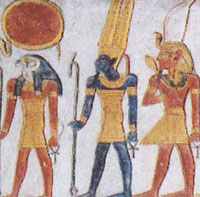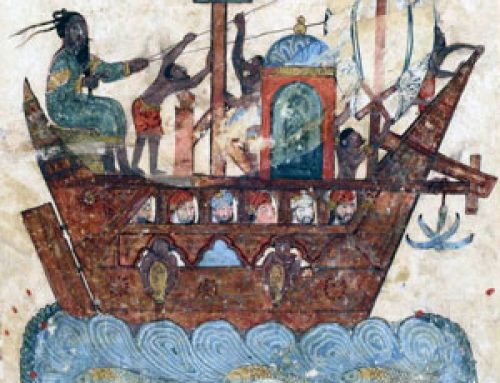
The Egyptian god Amun is the blue figure in the center.(From the tomb of Rameses VI at Luxor)
Why does Amun have blue skin?
Amun (or Amon), in Egyptian religion, was the god of air and wind. He was sometimes invisible, like air. Other times artists showed Amun with blue skin, or as a blue frog – blue like the sky. (Compare Amun with the Indian god Vishnu, who also is sometimes blue.)
Why does the wind blow?
Why is the sky blue?
The Indian god Vishnu
All our Ancient Egypt articles
Because Amun was the god of air, people also began to think of him as the god of the “ba”, or the soul, which is like the breath of life.
Egyptian afterlife
Religion in ancient Egypt
This made Amun seem more important. By the end of the First Intermediate Period, people thought of Amun as a god who created the world (because he gives life) and he got married to the goddess Mut.
Egyptian goddess Mut
The First Intermediate Period
Amun and the Aten
In the New Kingdom, the capital of the pharaohs was at Thebes, in Lower Egypt, and that was the main city where people worshipped Amun.
The New Kingdom
The Amarna Period
So the priests of Amun got very powerful. Some of the pharaohs had names that referred to Amun, like Tutankhamun. One pharaoh, Akhenamun, tried to take power away from the priests of Amun. He renamed himself Akhenaten after the “aten”, the sun, and built a new capital city at Amarna. But after Akhenaten died, the priests of Amun got back their power, and the pharaohs moved their capital back to Thebes.
Amun was an African god
Greek travellers like Herodotus thought of Amun as being like Zeus, and Amun’s wife Mut as being like Zeus’ wife Hera. But really Amun was an African god, who was also worshipped south of Egypt in Meroe, and in other parts of Africa by the Bantu.
The Greek god Zeus
African religion
All our Africa articles
How Amun was forgotten
After the Egyptian pharaohs stopped having their capital at Thebes, at the end of the New Kingdom about 1200 BC, fewer and fewer Egyptians worshipped Amun. People in Kush, further south, however, continued to worship Amun until about 200 BC.
Did you find out what you wanted to know about the Egyptian god Amun? Do you have more questions? Let us know in the comments.
Learn by doing: Egyptian afterlife project
More about Anubis
More about ancient Egyptian gods
Bibliography and further reading about the Egyptian god Amun:
Gods and Goddesses of Ancient Egypt, by Leonard Fisher (1999). For younger kids.
The Egypt Game (Yearling Newbery), by Zilpha Keatley Snyder (reprinted 1985). A great kids’ story about kids who pretend to be Egyptian gods and goddesses.
Religion in Ancient Egypt: Gods, Myths, and Personal Practice, by John Baines, David Silverman, and Leonard Lesko (1991). Pretty hard going, but it will tell you everything you need to know about Egyptian religion.


